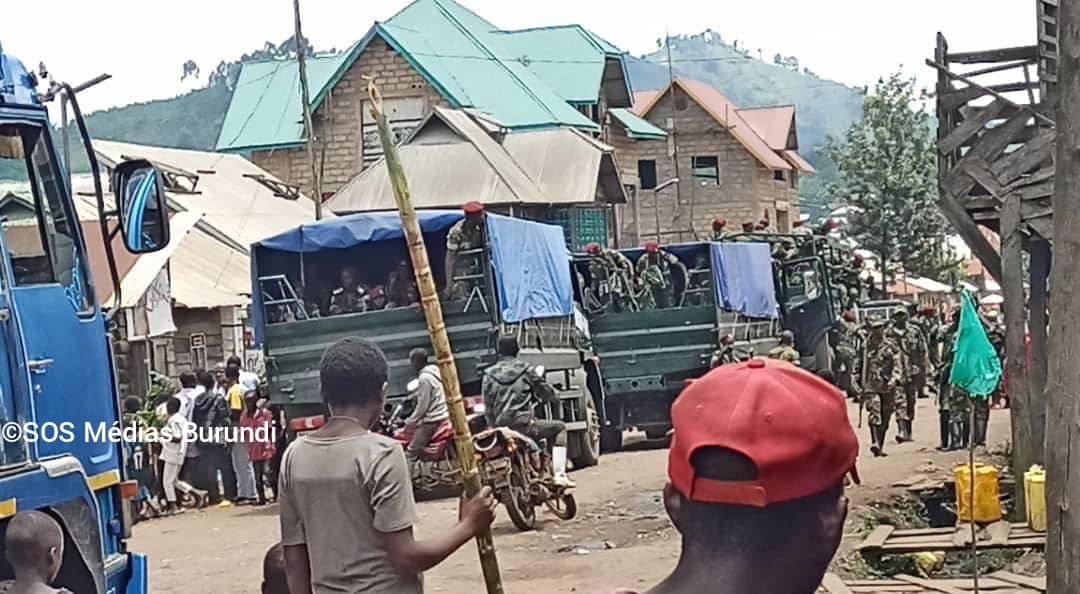South Kivu : Burundian troops in large numbers in Fizi to slow down Twirwaneho and contain the M23

SOS Médias Burundi
Bukavu, May 22, 2025 – Large-scale military movements have been observed in recent days in the eastern Democratic Republic of Congo. Since Wednesday, new Burundian troops have crossed Lake Tanganyika into the territories of Uvira and Fizi, in South Kivu province. The goal : strengthening the military presence against the Twirwaneho and M23 armed groups, in a volatile regional context.
Witnesses speak of a coordinated offensive following deadly clashes.
According to local sources, this redeployment follows violent clashes that occurred last week in Kahololo (Uvira), and more recently in Rugezi (Fizi), between Burundian forces, Wazalendo militias, the FARDC (Armed Forces of the DRC), and Twirwaneho fighters, presumed allies of the M23.
On Thursday, May 22, several Burundian soldiers stationed at the port of Mboko, in the Tanganyika sector, informed residents that they were heading to Bijombo, a strategic area in the highlands, to confront the rebels. According to our sources, their mission is to prevent the M23 from advancing towards Bijombo, Rurambo, and Minembwe. Other Burundian units were seen in Swima, en route to Gihamba and Kajembwe, in the Bijombo groupment, while in Kirumba—a known Twirwaneho stronghold—imminent clashes are feared.
The Burundian army on the front line
Burundian soldiers who had retreated after the fighting in Rugezi were seen in Mukela, where plans are reportedly underway to attack posts held by Twirwaneho and its allies. Also in Mulima, the military is seeking to open a new front towards Minembwe, another area of tension.
These movements come on the heels of a strategic meeting held on May 14 in Uvira between the Congolese and Burundian military high commands. According to security sources, the meeting reportedly marked an intensification of bilateral cooperation to contain the growing influence of Twirwaneho and the M23. Both groups are suspected of ultimately wanting to threaten Uvira, and even the Burundian city of Bujumbura, the commercial capital, located a few kilometers from Uvira.
Growing involvement in the Congolese crisis
Since 2022, the Burundian army has been deployed in the territories of Uvira, Fizi, and Mwenga, initially to fight the Burundian rebels of Red Tabara and the FNL (National Liberation Forces). But the mission has quickly evolved : approximately 10,000 Burundian soldiers are now reportedly engaged in the DRC in joint operations with the FARDC and pro-government Congolese militias.
Their main target now appears to be Twirwaneho, a local armed group composed of members of the Banyamulenge community, accused of having links with the M23.
The return of the M23 and the Kivu powder keg
The M23, a former Tutsi rebel group, took up arms again at the end of 2021 after accusing Kinshasa of failing to respect the reintegration agreements for its fighters. Since then, its troops have launched a lightning offensive in North Kivu and parts of South Kivu.
The movement now controls the capitals of these eastern provinces, areas rich in minerals, whose resources are coveted internationally and regionally. Despite international condemnation, the M23 continues to gain ground, facing a weakened Congolese army dependent on the support of regional powers, including Burundi.
An alarming humanitarian situation
The growing presence of foreign troops, clashes between armed groups, and intensive military operations have worsened the situation for civilians. In the highlands of South Kivu, the population finds itself caught between conflicting forces, regional geopolitical issues, and a simmering mining conflict, where national sovereignty seems to be relegated to the background.
——
A column of trucks transporting Burundian soldiers deployed in the Democratic Republic of Congo (SOS Médias Burundi)

